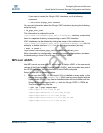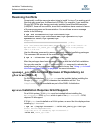
Draft
IB0056101-00 G.02 Preliminary 7-1
7 Installation Verification and
Additional Settings
This section provides instructions for verifying that the software has been properly
installed and that the drivers are loaded, and the fabric is active and ready to use.
Information on adapter performance tuning is also provided.
LED Link and Data Indicators
The LEDs function as link and data indicators once the InfiniPath software has
been installed, the driver has been loaded, and the fabric is being actively
managed by a subnet manager.
Adapter and Other Settings
The following settings can be adjusted for better performance.
Use taskset to tune CPU affinity on Opteron systems with the
QLE7240, QLE7280, and QLE7140. Latency will be slightly lower for the
Opteron socket that is closest to the PCI Express bridge. On some chipsets,
bandwidth may be higher on this socket. See the QLogic HCA and QLogic
OFED Software Users Guide for more information on using taskset. Also
see the taskset(1) man page.
On the switch use an IB MTU of 4096 bytes instead of 2048 bytes, if
available, with the QLE7240, QLE7280, and QLE7140. 4K MTU is
enabled in the InfiniPath driver by default. To change this setting for the
driver, see “Other Configuration: Changing the MTU Size” on page 6-14.
Use a PCIe Max Read Request size of at least 512 bytes with the
QLE7240 and QLE7280. QLE7240 and QLE7280 adapters can support
sizes from 128 bytes to 4096 bytes in powers of two. This value is typically
set in the BIOS.
Use PCIe Max Payload size of 256, where available, with the QLE7240
and QLE7280. The QLE7240 and QLE7280 adapters can support 128, 256,
or 512 bytes. This value is typically set by the BIOS as the minimum value
supported both by the PCIe card and the PCIe root complex.


















